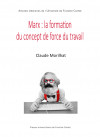
- Summary
-
In 1895, Émile Durkheim's "The Rules of Sociological Method" laid the foundations of sociology by introducing a key concept, that of "social facts." This concept aims to perceive social reality as fundamentally external to individuals, subjecting them to a strong coercive power. In 2017, numerous scientific events were organized to mark the centenary of the sociologist's death. Our book brings together about twenty authors whose works attest to the long-term fertility of the social fact, without neglecting its limitations. It thus reflects the valuable renewals of the concept in contemporary research around "Durkheimian" themes (work, education, religion, suicide) as well as on new grounds (precarity, peri-urban, feminism).
- Contents
-
Introduction :Ce que le concept de « fait social » fait à la sociologie
F. Moulène et J.-C. Marcel
Partie I : Défense et illustrations d’un concept fondateur
1 Le fait social au prisme des représentations collectives
J.-C. Marcel
2. Fait social, fait social total : permanence d’un paradigme
N. Sembel
3, Du « fait social » à la stabilisation du paradigme sociologique
M. Joly
4. De Durkheim à Giddens : une refondation britannique du fait social
B. Rocquin
Partie II : Réexamen critique du concept de « fait social » et pistes de relectures contemporaines
5. Le « fait social » durkheimien. Les limites d’une catégorie positiviste
R. Pfefferkorn
6, Le silence de Durkheim sur le « fait inégalitaire »
F. Moulène
7. Le conflit : un impensé de la sociologie du fait social
J.C. Marcel
8. Le fait social à l’épreuve de l’anthropologie de la personne et du corps
A. Raulin
9, Bergson, une lecture des déterminismes sociaux plus ouverte au devenir historique ?
A. Ozeki
Partie III : Renouvellement du concept dans la sociologie contemporaine :
thématiques durkheimiennes par excellence, contextes d'aujourd'hui
10. Le temps et le « fait social ». Le cas de l’école de la République »
J. Zaffran
11. Durkheim, fait social, religion et structure de la société
K. Van Meter
12. Le suicide des agriculteurs : la déconstruction du discours public à l’aune du fait social
N. Deffontaines
13. Du travail-institution à l’institution managériale. Penser la rationalisation institutionnelle du travail avec Durkheim et au-delà
L. Jacquot
Partie IV : Nouveaux champs d'application, « nouveaux faits sociaux »
14. Le fait social économique : comment faire de l’économie un objet sociologique ?
F. Lebaron
15. Le périurbain come fait social total. Des représentations sociales et des réalités territoriales qui s’imposent au plus grand nombre
H. Marchal et J.-M. Stébé
16. Le « précariat », un fait social mais pas une classe sociale
N. Roux
17. Le concept de fait social à l’ère du #Metoo et du mouvement LGBT
A. Alessandrin et J. Dagorn
Conclusion : Où va le concept de « fait social » ?
F. Moulène et J.-C. Marcel
Présentation des auteurs
Index des noms propres
- Author (s)
-
Jean-Christophe MARCEL (edit. director)Jean-Christophe Marcel is a sociology professor at the University of Burgundy, a researcher at the Group for the Study of Methods in Sociological Analysis at the Sorbonne (GEMASS), and also at the Interdisciplinary Research Laboratory "Society, Sociabilities, and Care" (LIR3S – UMR CNRS 7366). He is one of the leading experts in the history of French sociology and editor of the British-French journal, Durkheimian Studies.Frédéric MOULÈNE (edit. director)Frédéric Moulène is an associate professor of sociology at the University of Reims Champagne Ardenne, a researcher at the Regards laboratory (EA 6292), and also affiliated with the Elliadd research unit at the University of Franche-Comté. His work focuses notably on the role of language in social relations.
- Readership
-
University public
- downloadable items
- Support (s)
-
Published with the support of the ELLIADD laboratory (UR 4661).












